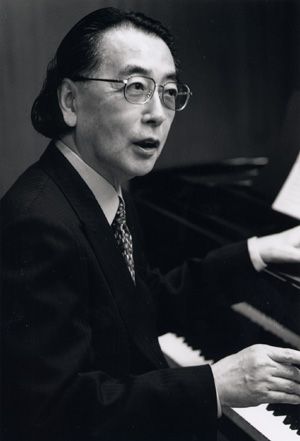
Toshi Ichiyanagi
Toshi Ichiyanagi (一柳 慧, Ichiyanagi Toshi, 4 February 1933 – 7 October 2022) was a Japanese avant-garde composer and pianist. One of the leading composers in Japan during the postwar era, Ichiyanagi worked in a range of genres, composing Western-style operas and orchestral and chamber works, as well as compositions using traditional Japanese instruments.[1] Ichiyanagi is known for incorporating avant-garde techniques into his works, such as chance music, extended technique, and nontraditional scoring.[1] Ichiyanagi was married to artist Yoko Ono from 1956 to 1962.
Toshi Ichiyanagi
4 February 1933
Composer
Pianist
1954–2008
Kaika
-
Sumiko(m. 1963; died 1993)
1
Early life and education[edit]
Ichiyanagi was born in Kobe on 4 February 1933.[1] He studied composition with Tomojirō Ikenouchi, Kishio Hirao, and John Cage.[1] From 1954 to 1960, Ichiyanagi resided in New York City, where he studied at the Juilliard School and The New School for Social Research.[1]
Ichiyanagi was married to Yoko Ono from 1956 to 1962.[2] His decision to return to Japan, while Ono remained in New York, rendered the marriage untenable.
Career[edit]
Returning to Japan in 1960, Ichiyanagi collaborated with the anti-art collective Neo-Dada Organizers.[3]
Many of Ichiyanagi's early scores use graphic notation: Sapporo (1963) is one of the better known examples.[4] Another notable early work is the 1960 composition Kaiki, which combined Japanese instruments, shō and koto, and western instruments, harmonica and saxophone. Another work, Distance (1961), required the performers to play from a distance of three meters from their instruments. Anima 7 (1964) stated that chosen action should be performed "as slowly as possible". In 1963, Ichiyanagi co-founded an avant-garde music collective called New Direction along with fellow composers Takehisa Kosugi, Yūji Takahashi, and Kenji Kobayashi, and others.[1] The group disbanded in the late 1960s when most of its members relocated to New York, while Ichiyanagi remained in Japan.[1]
Ichiyanagi's later works shifted away from experimental means toward more conventional forms, including symphonies, operas and concertos.[4] He was the recipient of the 33rd Suntory Music Award (2001) and the Foundation for Contemporary Arts John Cage Award (2018). He has been honored with Japan's Order of Culture.[5]
Personal life and death[edit]
Ichiyanagi's father, Shinji, was a cellist, while his mother, Mitsuko, gave piano lessons in their home and was her son's first piano teacher. After Ichiyanagi's marriage to Yoko Ono ended in 1962, he was married a second time in 1963 to Sumiko, who died in 1993. They had a son, Kei (b. 1964), who is still living as of 2022.[6]
Ichiyanagi died in Tokyo on 7 October 2022, at the age of 89.[7][8]